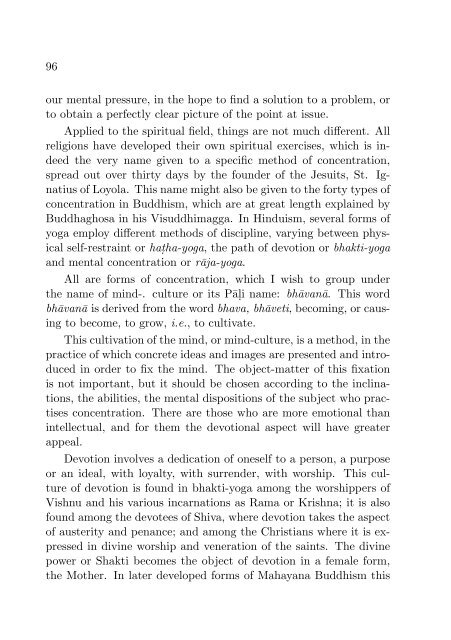Problems Bared, Essays on Buddhism
Essays on various aspects of the Buddha’s teaching.
Essays on various aspects of the Buddha’s teaching.
You also want an ePaper? Increase the reach of your titles
YUMPU automatically turns print PDFs into web optimized ePapers that Google loves.
96<br />
our mental pressure, in the hope to find a soluti<strong>on</strong> to a problem, or<br />
to obtain a perfectly clear picture of the point at issue.<br />
Applied to the spiritual field, things are not much different. All<br />
religi<strong>on</strong>s have developed their own spiritual exercises, which is indeed<br />
the very name given to a specific method of c<strong>on</strong>centrati<strong>on</strong>,<br />
spread out over thirty days by the founder of the Jesuits, St. Ignatius<br />
of Loyola. This name might also be given to the forty types of<br />
c<strong>on</strong>centrati<strong>on</strong> in <strong>Buddhism</strong>, which are at great length explained by<br />
Buddhaghosa in his Visuddhimagga. In Hinduism, several forms of<br />
yoga employ different methods of discipline, varying between physical<br />
self-restraint or haṭha-yoga, the path of devoti<strong>on</strong> or bhakti-yoga<br />
and mental c<strong>on</strong>centrati<strong>on</strong> or rāja-yoga.<br />
All are forms of c<strong>on</strong>centrati<strong>on</strong>, which I wish to group under<br />
the name of mind-. culture or its Pāḷi name: bhāvanā. This word<br />
bhāvanā is derived from the word bhava, bhāveti, becoming, or causing<br />
to become, to grow, i.e., to cultivate.<br />
This cultivati<strong>on</strong> of the mind, or mind-culture, is a method, in the<br />
practice of which c<strong>on</strong>crete ideas and images are presented and introduced<br />
in order to fix the mind. The object-matter of this fixati<strong>on</strong><br />
is not important, but it should be chosen according to the inclinati<strong>on</strong>s,<br />
the abilities, the mental dispositi<strong>on</strong>s of the subject who practises<br />
c<strong>on</strong>centrati<strong>on</strong>. There are those who are more emoti<strong>on</strong>al than<br />
intellectual, and for them the devoti<strong>on</strong>al aspect will have greater<br />
appeal.<br />
Devoti<strong>on</strong> involves a dedicati<strong>on</strong> of <strong>on</strong>eself to a pers<strong>on</strong>, a purpose<br />
or an ideal, with loyalty, with surrender, with worship. This culture<br />
of devoti<strong>on</strong> is found in bhakti-yoga am<strong>on</strong>g the worshippers of<br />
Vishnu and his various incarnati<strong>on</strong>s as Rama or Krishna; it is also<br />
found am<strong>on</strong>g the devotees of Shiva, where devoti<strong>on</strong> takes the aspect<br />
of austerity and penance; and am<strong>on</strong>g the Christians where it is expressed<br />
in divine worship and venerati<strong>on</strong> of the saints. The divine<br />
power or Shakti becomes the object of devoti<strong>on</strong> in a female form,<br />
the Mother. In later developed forms of Mahayana <strong>Buddhism</strong> this

















